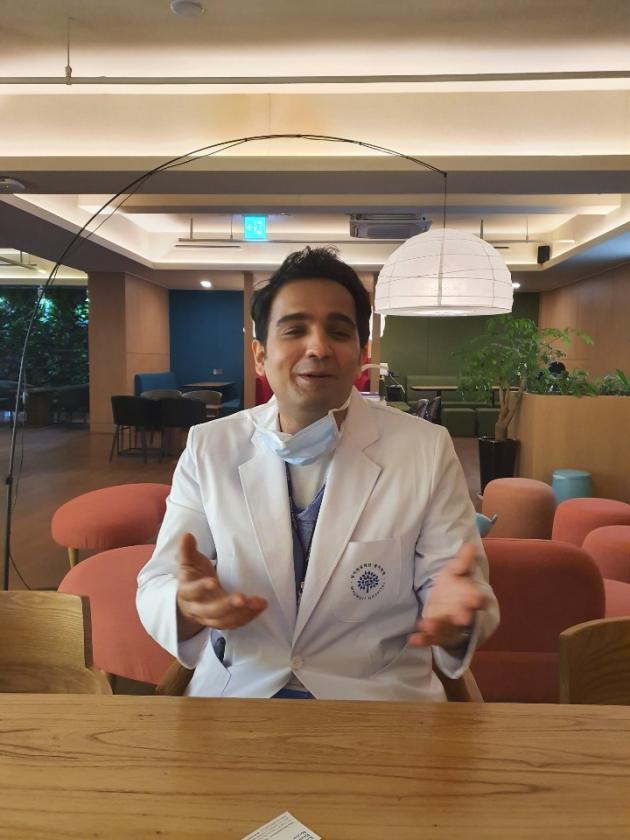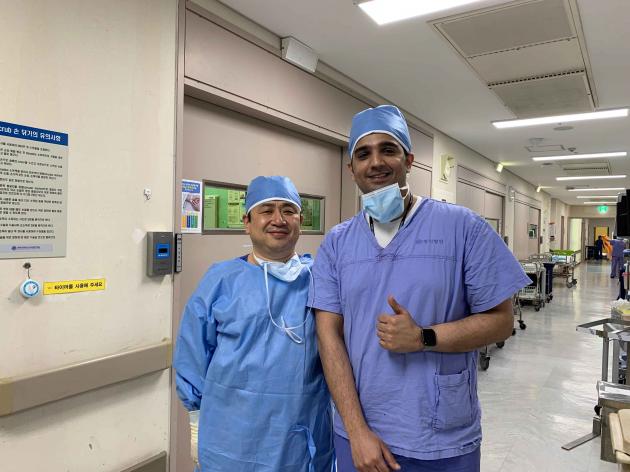Myongji Hospital's Sports Medicine Center, operated by the hospital’s president, Professor Kim Jin-goo, is attracting attention from foreign doctors who want to receive the unique training that only Kim can provide.

The center has been well known in Korea for offering comprehensive -- surgical and non-surgical -- treatment and one-on-one special exercise programs for professional athletes. Professor Kim is one of the most renowned specialists in sports medicine in the nation.
According to Kim, about 60 to 80 foreign doctors come to the hospital to learn from him annually. Amid the mounting interest, the hospital plans to open an official program at Myongji Hospital International Arthroscopic Center and invite doctors who want to learn Kim's unique surgery methods in March.
Before the hospital officially launches its program, Korea Biomedical Review met with Dr. Luv Mukhi from Dr. Mukhi's Raj Hospital in India, a recent trainee under Professor Kim, to know what he learned at the hospital.

Question: Why did you decide to attend the training program at Myongji Hospital?
Answer: I've been training around the world, including the U.S. and France. During my latest training at Leon, France, my training professor recommended that I come to Korea and learn from Dr. Kim as he has a lot of experience in meniscal surgery, which is a surgical procedure to repair torn knee cartilage, and allograft transplantation.
As allograft transplantation is not commonly used in India, I decided to come to Korea and receive the training.
Q: What have you learned during your time here?
A: I saw very diverse surgery methods here at Myongji Hospital.
Back home, we only used to do anterior cruciate ligament (ACL) and meniscal surgeries. However, at Myongji Hospital, I had the chance to participate in the meniscal allograft transplantation surgery, which is not very common in India.
The surgery is for professional athletes that have completely damaged meniscal but want to continue their career. The operation allows them to continue their career and improve their quality of life.
We also saw a lot of ACL and anterolateral ligament (ALL) surgeries. While those surgeries are more common in India, Professor Kim does it is entirely different from what I have seen in other countries. His surgery method is more precise and quicker than other surgery methods that I know.
He does it with two separate techniques. Professor Kim first treats the ACL and then the ALL by conducting an inside-out technique, which is a surgery method of making a tunnel in the femur and then the tibia and then constructing the lateral complex. Through this surgery, the biomechanics of the knee becomes more stable.
Q: Do you think the practice you've learned here will be useful after you go back?
A: Yes. It will be very helpful because if you deal with professional athletes, you need to know these surgeries.
This is why Myongji Hospital is exceptional as it has its own separate sports medicine center for treating such athletes. In India, we mainly treat athletes alongside the general population. Therefore, we are not generally exposed to these kinds of surgeries back home.
Q: As you finished your training, would you recommend this course to other doctors?
A: Definitely. Even though Korea is going through the new coronavirus outbreak, I saw that this hospital conducts operations and management in a very systematic fashion so you can feel very safe here.
The hospital staff also made me feel very at home. Everyone was very caring and always had lunch with me and took an interest in me. I've made a lot of friends during my training here.
Regarding any advice I can give to doctors considering coming to Myongji Hospital for training, I would have to say come for an extended period, so you learn everything Professor Kim has to offer.
Q: Korea is currently fighting the new coronavirus outbreak. Weren't you a bit worried about coming?
A: I was a bit worried at first, but after arriving at the Myongji Hospital, I saw that their quarantine and treatment procedures were exceptional. Every time people enter the hospital, workers here are standing at the door to screen their temperature, and if they test okay, they give you a sticker so that you don't have to get checked every single time.
Also, every hospital staff member has to wear a mask, while the hospital provides hand sanitizers everywhere.
The preparation is so perfect that I felt safe from the moment I stepped foot in the hospital.

